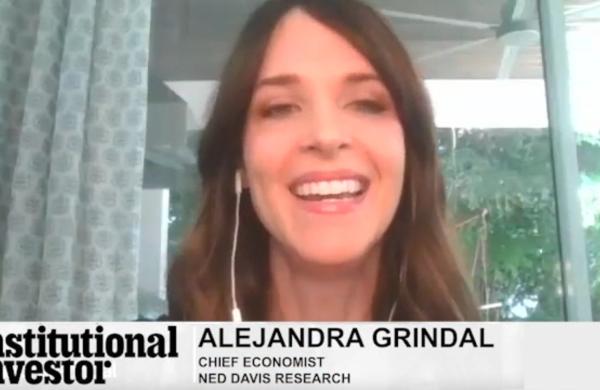Sustainable fixed income investment strategies don’t grow on trees, even if they are friendly to them. While approaches that integrate sustainability into equity strategies are not uncommon, institutional investors have had limited if any opportunity to access U.S. core fixed income through a sustainable strategy that maintains a keen focus on return objectives. That state of play is in the process of being upended, however, due in large part to the muscular proprietary research capabilities at Aegon Asset Management US.
The movement toward sustainable investment strategies that seek to make an impact alongside traditional investment returns is happening in plain view. The end beneficiaries of institutional investments are clearly expressing their preference for a global economy that meets the needs and aspirations of people today and in the future, while also reducing the impact on the environment and preserving a harmonious global society. Typically, they express these views through equity strategies, which offer investors a say in how their money is invested.
It’s a different story in fixed income, but that does not in any way diminish the asset class’ important contribution to achieving both the financial and sustainable goals of investors – it merely punctuates the need for a solution.
“Most investment strategies that focus exclusively on the impact essentially push investors’ need for a return to the side,” says James Rich, Chairperson of the Sustainable Investment Committee and Portfolio Manager, at Aegon AM US. “We’ve created a thematic fixed income strategy that uses sustainability as a way to address our clients’ financial goals over time. We believe incorporating a thematic overlay of sustainability may not only provide the potential to generate out-performance over the long term, but also make a positive impact on the global economy, environment, and society.”
Customized definition of sustainability by issuer type
Creating a thematic product that invests alongside sustainability trends starts with the UN’s 17 sustainable development goals (SDGs) and their 169 underlying targets to be achieved by 2030.
“The SDGs are a common language that we can use to help define sustainability for investors,” says Rich. “Within those are a series of sustainable megatrends. Some are obvious, such as alternative energy, but there are others that span across many different objectives and industries, including the promotion of energy efficiency, vehicle electrification, and sustainable agriculture. Each megatrend provides an opportunity for our clients to invest alongside sustainable initiatives. Ultimately, if you believe as we do that each of these megatrends is going to continue, then investing alongside them may provide the opportunity for improved outcomes for our clients relative to investing traditionally.”
U.S. core fixed income is a large universe that a diverse strategy that looks and feels like a traditional core product, but in fact, can be reduced to issuers that are more sustainable in the long term.
The difference between a traditional U.S. core fixed income product and Aegon AM US’ sustainable fixed income investment strategy is the thematic overlay derived from sustainable megatrends, along with sub-themes that emerge. The strategy aims to invest in debt issuers that have products, services, or practices that are aligned with the sustainable megatrends we have identified. “It’s the same asset classes and same types of issuers as you would see in a traditional U.S. core fixed income product –investment-grade corporates, securitized credit, and sovereign bonds, combined with opportunistic allocations to emerging markets, below investment-grade corporates, and bank loans, for example,” says Rich.
Critical in all of this, however, is Aegon AM US’ deep bench of research talent and resources that makes possible a customized research approach and definition of sustainability for every issuer type and asset class. This capability cannot be overemphasized in a broad core fixed income strategy with investments allocated across different issuer types and different asset classes. As it relates to issuer type, this boils down to a proprietary and differentiated process to assess the sustainability and economic potential for corporate issuers, securitized credit, and sovereign issuers.
“While the SDGs can serve as a guidepost, they weren’t designed for investors, so you really need a customized definition of sustainability for each issuer type and asset class,” says Rich. “We utilize our proprietary in-house research as the primary means for developing and managing our sustainable fixed income strategy and view this as being critical to its future success. Our corporate, structured and emerging markets research analysts are the primary means by which we conduct our sustainability research.”
Pursuing better outcomes
All of this adds up to a differentiated core fixed income strategy that incorporates sustainability and seeks competitive financial returns – while also creating a positive impact on the global economy, environment, and society. Furthermore, even if fixed income investors don’t have the same voice as an equity shareholder, they do have control over their own capital and can engage with issuers to encourage advancement of sustainable initiatives.
“We believe one way to contribute both to potential outperformance for our clients and, ultimately, to sustainability, is by directing their capital toward sustainable issuers,” says Rich. “If you invest in a sustainable issuer, you’re essentially lowering its cost of capital. On the other hand, by withholding investment from an unsustainable issuer, you’re raising the cost of its capital. While the effect may be negligible in the beginning, as the sustainable movement multiplies, the broader impact has the potential to be meaningful. That’s one of the ways that we think that fixed income can actually have a material impact on the company that you invest in.”
Learn more about the sustainable fixed income strategy you’ve been waiting for.
Aegon Asset Management US is a US-based SEC registered investment adviser and is also registered as a Commodity Trading Advisor (CTA) with the Commodity Futures Trading Commission (CFTC) and is a member of the National Futures Association (NFA). Aegon Asset Management US is part of Aegon Asset Management, the global investment management brand of the Aegon Group.
The information contained in this article is for informational purposes only and should not be considered investment advice or a recommendation of any particular security, strategy or investment product. The article contains the current opinions of the author and is accurate as of the date of the article. Such opinions are subject to change without notice. The author is under no obligation, expressed or implied, to update the material contained herein.
This article contains forward-looking statements which are based on the author’s beliefs, as well as on a number of assumptions concerning future events, based on information currently available to the author. These statements involve certain risks, uncertainties and assumptions which are difficult to predict. Consequently, such statements cannot be guarantees of future performance, and actual outcomes and returns may differ materially from statements set forth herein.
There is no guarantee these investment or portfolio strategies will work under all market conditions or are suitable for all investors and each investor should evaluate their ability to invest over the long-term, especially during periods of increased market volatility. All investments contain risk and may lose value. Investors should consult their investment professional prior to making an investment decision.





